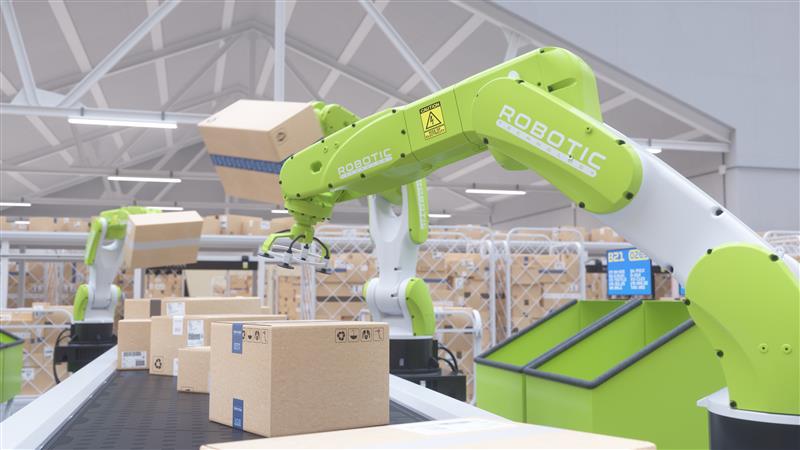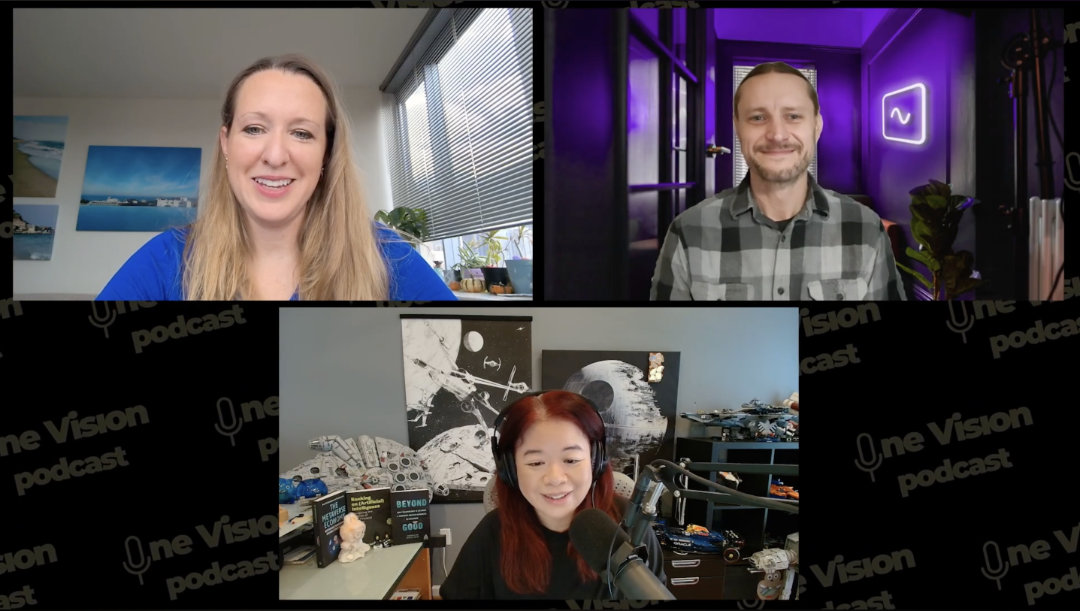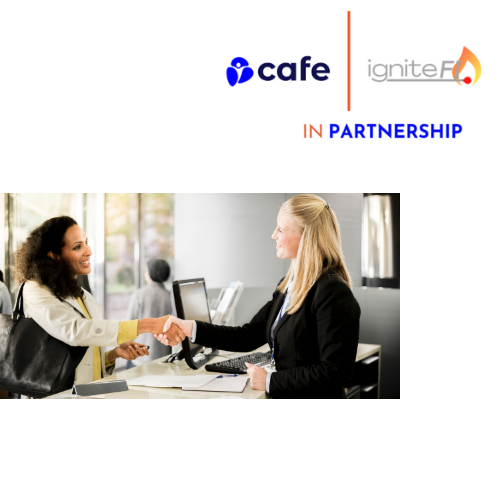Founder Feature: Jay Long and Alex McLeod from Parlay share their journey to creating an impact-driven fintech and being a member of CAFE’s fintech accelerator.
“Small businesses make up 44% of our GDP but they are vastly underserved.
When they seek capital, they get two answers, either a yes or no, and 70% of the time it is a no,” says Alex McLeod, co-founder, and CEO of Parlay. These challenges are exacerbated for veteran-owned and minority-owned businesses. According to the 2022 National Survey of Military-Affiliated Entrepreneurs, veteran business owners face barriers due their lack of access to capital (37%), and lack of financing (34%) according to Mission Role Call. Similarly, according to the SBA, “White business owners (35%) were more likely to be fully approved for business loans compared to Hispanic (19%), Black (16%) and Asian (15%) business owners.”
Parlay is committed to helping community banks and credit unions get more small businesses approved for loans. Parlay is part of the Center for Accelerating Financial Equity’s (CAFE) flagship Fintech Accelerator program cohort. CAFE is committed to working with innovative fintechs who are building technology to support immigrant, low-to-middle income (LMI), and other underserved communities.
We are featuring founders of our participating companies; this week, we are featuring Jay Long, co-founder, COO and Alex McLeod, co-founder, CEO of Parlay. They co-founded Parlay with James Cho, co-founder, and CTO in 2022. Here’s a snippet from our chat with them.
Tell us a little bit about yourself and your background.
Jay: “I’m the Chief Operating Officer at Parlay. Before launching Parlay, I was in the military, where I served as an Operations Officer. In the military, I grew into a role at the Joint Special Operations Command where I was an innovation officer. During my time there, I uncovered the problem of small business loans that Parlay was created to solve.”
Tell us a little bit about Parlay and how you started it. Was there a specific experience or moment that sparked the idea for your company?
Jay: “We are 3 co-founders. James, one of the co-founders and CTO, and I served together in the military. Alex, our co-founder, and CEO, has a background in leading businesses. This is her third company focused on financial inclusion. Worth noting that we are married so that’s how we met.
We came across this issue of financial inclusion during an Afghan Evacuation Resettlement program that the army ran. Evacuees were brought to the US, and a lot of them wanted to build their own businesses and a big part of that was access to capital. Their inability to access capital showed us how this is a problem for a lot of small business owners. There are 33 million small businesses in the US, and they make up so much of our economy and yet 4 in 5 will get denied access to capital. We wanted to remove this barrier to access capital and make this intimidating process more transparent.”
Alex: “The team at Parlay has spent a lot of time on financial inclusion and initiatives on the ground. We started by helping small business owners from Afghanistan and realized the problem was much broader. Small businesses make up 44% of our GDP but they are vastly underserved.
When they seek capital, they get two answers, either a yes or no, and 70% of the time it is a no. We are giving them another option–which is a ‘not yet,’ and making the process more transparent by telling them what it takes to get to a yes.”
Were there any challenges you faced in starting an impact-driven business in particular?
Alex: “Early on, there was some apprehension from venture capitalists and funders in our communities. They did not think it was possible to be mission-driven and make money–they said it sounded like a nonprofit. We knew it was possible to be both high growth and mission driven. One of Jay’s favorite things to say is that we are unlocking the capacity that exists in the system. We are driven to make it work on the revenue and the impact front.”
What has been the most rewarding aspect of your entrepreneurial journey?
Jay: “I’ve been thrilled to see how many small businesses are one connection or resource away from reaching their potential. It’s great watching communities gain access to resources which allows them to grow.
It’s rewarding that we are increasing the capacity for business owners to get access to these resources. We believe that capital is one of the key ingredients to inclusion and community growth. We did a lot of research on systemic inequalities, and we found that people’s perceived ability and confidence to navigate the financial system is a big systemic barrier to inclusion which we are committed to removing.”
Alex: “We love to partner with people who are mission-oriented and want to do the work in a scalable way. We want to be the right resource for business owners. One lender may not be the right fit for this business, but another lender might be the perfect fit. We want to be able to create that connective tissue.”
What prompted you to apply for the CAFE accelerator program?
Jay: “We came across CAFE, and we wanted to work with other fintech founders empowering others as a means of service. These founders are great to learn alongside, and we’re excited to continue working with the community. CAFE’s mission to accelerate financial equity was such an empowering approach in the mid-Atlantic region where we are based.”
Alex: “We love being a part of the mission-oriented cohort. Everyone from the participants, the stakeholders that Kristen and her team bring into the program is great to connect with. It’s a unique take on financial inclusion with a full profit and a non-profit angle.”
Tell us more about your goals on networking and mentorship through the fintech accelerator program.
Jay: “I feel really inspired by other teams doing this work in the region to increase financial access. We are continuously discovering other partners and groups leading change and building a better future. Every time we have gotten a chance to learn from mentors, it has helped accelerate our team’s growth.”
Alex: “Some of the things I love the most about the program are that we’ve met industry leaders from every field. It’s the beginning of several relationships and we’re hoping to deepen those relationships and identity collaboration points. Additionally, the cohort members have shown us what it’s like to do this work well and what this would look like for us in the next few years.”
How does Parlay reach out to community banks and credit unions? Are there any challenges you have faced in getting them on board?
Alex: “We had to learn what it looked like to sell to a bank or credit union and learn what they are looking for, what their risk committees are like; CAFE mentors have helped us with that too. They’ve given us both a big and small bank’s perspective.”
Jay: “One of our mentors shared that if you are a double bottom line company, focused on your mission and profit, you must hide the medicine in the candy. It has to have enough business value and objectively make sense for the bank to invest in. Incidentally, a lot of the ways it manifests itself operationally is that it empowers community as a byproduct.”
How does your business evaluate the impact you create in underserved communities and underrepresented business owners?
Jay: “It’s key to figure out how you track down the most critical variable. For us, the most important variable is expanding capital deployment to small businesses and the secondary job creation will flow naturally.”
Alex: “We think about impact in terms of community and connection, how we connect small businesses to banks and education, and whether they have learned about what it takes to get capital. We also want to make sure that they can discern whether it is good funding, affordable and viable for them.
For the lender, our goal is to help them lend efficiently and see if they can do more of this for more underserved businesses. We want to help community banks and credit unions give out more loans and help them meet their goals and commitments to their communities.”

The future of work in Delaware
Backing innovation and strengthening our...

CAFE Leaders Featured on One Vision Podcast to Discuss Financial Equity, Founder Collaboration, and the Future of Fintech
The One Vision Podcast has released a new...

Press Release Dec 2, 2025: IgniteFI and CAFE Partner to Empower Fintechs Serving Credit Unions
IgniteFI, a leading fintech advisory firm...
Nester: Founder Feature
Brendan Kennealey from Nester shares his journey in building an impact-driven startup to empower homeowners and joining CAFE’s fintech accelerator.
According to the Pew Research Center, owning a home is often the largest asset for US homeowners. Owning and maintaining can be extremely costly. “Seventy-seven percent of homeowners say they faced an unexpected issue or repair with their home in the first year of ownership, according to a recent survey from the insurance company Hippo.” in the National Association of Realtors magazine.
Brendan Kennealey founded Nester in 2021 specifically to help new homeowners to better prepare for these expenses. These unexpected expenses can be especially burdensome on low-to-middle income homeowners. “Homeowners may put a large, unexpected home repair on their credit card and get into that debt cycle and this affects low- to moderate- income (“LMI”) homeowners more than others,” says Kennealey.
Nester is part of the inaugural cohort of CAFE’s flagship Fintech Accelerator program. CAFE is committed to working with innovative fintechs who are building technology to support immigrant, LMI, and other underserved communities.
Each week, we are featuring founders of our participating companies and their impact on underserved communities. This week, we are featuring Brendan Kennealey from Nester. Here’s a snippet from our chat with him.
Tell us a little bit about yourself and your background. Was there a specific experience or moment that sparked the idea for your company?
“My background is primarily in education, I went to Boston College and Harvard Business School and lived in the Boston area for almost 15 years and worked with different schools. I also worked in education in Rwanda. After that, I moved to Wilmington, DE, where I worked as Head of School at Salesianum School. After 10 years there, I transitioned into Nester. Starting a fintech startup after education seems a little off path.
The reality was, that I was having dinner with one of my best friends who recently bought a house. It was a relatively new house, only about 10 years old but there were lots of things wrong with the house, and he was extremely frustrated. However, a lot of the stuff going wrong was up against its useful life and he had no insight into it.
I realized that he’s not alone. The number one regret that homeowners have is the cost of maintaining their house. Most of these costs are predictable since we can project what will need replacing based on the useful life of different things in the home. We used to project this for the schools I worked at, and it got me thinking, why not do this for the homes as well? I wanted to make owning a home a better experience for homeowners.”
Tell us a little bit about Nester.
“We got started with the idea of helping home buyers. Sort of like how Carfax sits in the transaction of a used car, Nester would sit in the transaction of a used house if you will. Before the buyer gets their house, we give them their Nester report, where we put home maintenance costs in a digestible timeline. We show them how much they need to save per month in addition to their mortgage to afford the costs of owning their home. We also give every house a Nester score like a FICO score for the house, which changes based on where your house is in its lifeline. For example, if you replace your roof, the score goes up because you won’t have to change it for a long time.
We give home buyers follow-up questions to ask the seller and realtor, to help them get more educated. For a buyer, we can also help them compare houses side by side. It’s complicated for someone to do all these calculations on their own. We are independent and we don’t take positions about this being a good or bad house, one may be more expensive in sticker price but when you factor in maintenance, it changes the math.”
How does Nester impact LMI populations?
“Nester works and is valuable whether a house is $100,000 or $1 million. Interestingly, the value increases for folks who are lower and middle-income. If their roof or furnace goes, it can be a major burden financially.
We are partnering with government entities and financial institutions. Every state has a state housing program where they provide down payment assistance and first homeowners programs. They have this dual mission to help people get access to homeownership and do it in a way to make sure these homeowners are not getting in over their heads. We are currently partnered in our hometown with the city of Wilmington, Delaware. We are now looking at these partnerships as priority number one.
Priority two is financial institutions. For most people, their house is their biggest asset, if you are a bank or credit union and your customer is looking to buy a home, you can provide them value with Nester and cross-sell other products too. We also have a partnership with Habitat for Humanity and we’re looking at that to expand out beyond local networks.”
What has been the most rewarding aspect of your entrepreneurial journey?
“Honestly, it is customers and when they get the report, just the relief that they get is so valuable to us. We do a lot of in-person focus groups and such, for our product development, and seeing the reaction of the customers when they get the report is great. We recently did Nester reports for a group of 4 single moms who were soon to be homeowners for Habitat for Humanity.”
What prompted you to apply for the CAFE accelerator program?
“When I heard what CAFE was doing, it felt like a great fit especially as we transition to working with government and financial institutions. CAFE’s mission to advance financial equity aligns with our product, which is getting traction with LMI homeowners and home buyers.”
Tell us more about your goals on networking and mentorship through the fintech accelerator program and how it’s been so far.
“Our primary goal is getting quicker access to financial institutions and CAFE has a great network of financial institutions, community banks and credit unions. That’s something that we are starting as a channel for Nester. We also want to get smarter about selling to these kinds of institutions. I think that’s gone well particularly on the learning side, not just from the speakers but from the other founders who have gone through this. The other founders in the cohort have shared some of their learnings and mistakes they made. Meeting other founders in similar industries is the benefit of this cohort model.
Third down the list of goals is that we are likely going to look for institutional funding soon, be it venture capital or a strategic partnership, we are looking at getting access to those.”
Are there any challenges you have faced in getting financial institutions on board?
“The challenge we’ve seen is from the financial institutions’ side. Getting in the door is the first hurdle but even when you are through the door, there is no linear path to getting a partnership signed. Every bank is different, there are multiple people making decisions, and they all need to sign off on a partnership in no set order. Each bank has their process; certain things are similar, but they are a lot different.
Navigating that process and figuring out the people who will be involved in that decision and trying to somehow get them to a consensus, is not unique to us but a big challenge for us. CAFE has been helpful in that, part of what has been helpful is the reassurance that we’re not crazy, everyone is facing that. We are also learning things we can do to make this process better.”
How does your business evaluate the impact you create in underserved communities?
“Having an impact on LMI communities is super important to us, my background has largely been in education and working with LMI communities. We have a product that is useful to everybody but has a large impact on LMI homeowners. I believe every transaction should come with a Nester report – there’s no downside to having more information. Without the foresight Nester provides, homeowners may put a large, unexpected home repair on their credit card and get into that debt cycle and this affects LMI homeowners more than others. The fact that our product can play an important role there, it’s a huge win for us personally and professionally.”

The future of work in Delaware
Backing innovation and strengthening our...

CAFE Leaders Featured on One Vision Podcast to Discuss Financial Equity, Founder Collaboration, and the Future of Fintech
The One Vision Podcast has released a new...

Press Release Dec 2, 2025: IgniteFI and CAFE Partner to Empower Fintechs Serving Credit Unions
IgniteFI, a leading fintech advisory firm...

